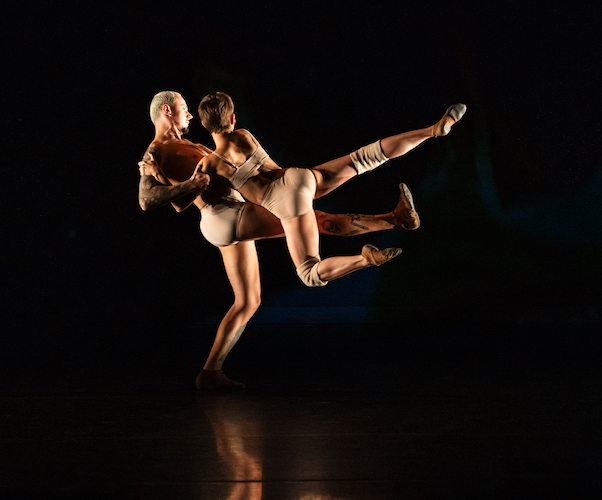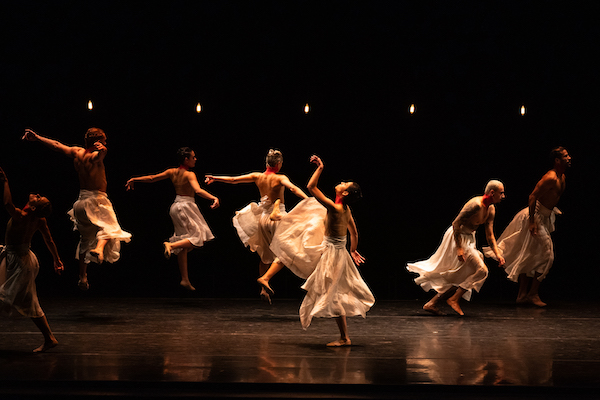Dance Review: Brazil’s Grupo Corpo — Floating Free
By Jessica Lockhart
Grupo Corpo’s dancers are as technically astute as those at other top dance companies, but they excel at conveying a lushness of movement that feels sensual rather than sexual.
Grupo Corpo, Boch Center Shubert Theatre

Grupo Corpo’s Lucas Saraiva and Agatha Faro performing Gil Refazendo. Photo: Robert Torres
Two minutes after the Brazilian contemporary dance company Grupo Corpo took to the stage at the Boch Center on October 29 I began to smile, to feel warm inside. The dancers were sweetly moving to the beautiful music of Gilberto Gil: it was joyous to see how those rich and beautiful sounds inspired such playful dancing. This group of 20 performers drew on their strength, fluidity, and rhythmic finesse to mesmerize. Their physical grace, accompanied by powerfully grinning faces, was designed to lighten souls and relax hyper-worried minds. Their swaying hips and undulating shoulders seemed to transport the audience to balmier climes.
The performance featured two dances choreographed by Rodrigo Pederneiras. The first was 2022’s Gil Refazendo. The score was taken from the work of Gil, one of Brazil’s most renowned singer/songwriters, and it included many of his most famous tunes. The sound varied from the whimsical, which depended on strong drum beats and rhythms, to the quietly melancholy. The piece began with a dancer whose quick, sharp, edgy steps melted into big flowing gestures. The dance see-sawed back and forth — from the sultry to the quirky and eventually the magical. Then another performer and then another joined the performance until the stage was crowded with the entire troupe. The pacing and staging of the piece exuded a lush sense of oceanic motion, movements coming and going like a loose assemblage of waves.
The costumes by Freusa Zechmeister were simple: white linen shirts that flowed over simple shorts for the women and trousers for the men. The backdrop was a muted but colorful image that was out-of-focus, its hues moving slightly to offer different visuals throughout the dance. Near the end of the piece, the image was animated via sped-up time elapse: it was a picture of a giant sunflower growing and opening. Then the perspective pulled out to reveal hundreds of sunflowers. The message was clear: this was a sampling of Brazilian warmth and sunshine.
Grupo Corpo’s dancers are as technically astute as those at other top dance companies, but they excel at conveying a lushness of movement that feels sensual rather than sexual. The impression is that you are watching dancers express a comfortable, primal ease with their bodies. That illusion of weightlessness infuses their movements with a special grace — an extended leg wafts into the air and then seems to float.

Grupo Corpo performing Gira. Photo: Robert Torres
The second piece on the program was 2017’s Gira, an enactment of an intense and demanding ritual. The torsos of the dancers, female and male, were naked. They were costumed in full linen skirts. The piece taps into the origins of an Afro-Brazilian religion: the program noted that Candomblé and the spiritualist doctrine Kardecism influenced the aesthetic design of the choreography. The performers gave off the impression that they were determined warriors dedicated to completing a dazzling, even hypnotic, ceremony. When they weren’t on stage, the dancers sat in chairs around the edges of the stage and covered themselves in black tulle. The performers were still an active part of the performance — even though they were cloaked. The suggestion is that we were seeing the actions of a religious sect, like the Shakers, whose services called for witnesses whose godly purpose was to remain still.
The music by São Paulo trio Meta Meta fused punk, jazz, samba, Afrobeat, and candomblé into a compelling visceral soundscape. The dancers were driven by the music to keep moving — they seemed to be on an increasingly demanding quest for something. Solos and partnering interludes were executed with wonderful grace and speed. The performers moved with an ever-renewed energy — they were perpetual motion machines on the hunt for transcendence. Something was not quite right, though, because they couldn’t stop, they couldn’t reach nirvana.
These terrific dancers must be individually acknowledged: Agatha Faro, Bianca Victal, Davi Gabriel, Dayanne Amaral, Debora Roots, Edesio Nunes, Giulia Madureira, Isabella Accorsi, Jonatas Itaparice, Jonathan de Paula, Karen Rangel, Luan Barcelos, Lucas Saraiva, Malu Figueroa, Rafael Bittar, Rafaela Fernandes, Tris Martins, Vitória Lopes, and Walleyston Malaquias.
Rodrigo Pederneiras founded the company in 1975 in Belo Horizonte, Brazil. The program informs us that, in the performances of Grupo Corpo, “all facets of Brazil: past and future, erudite and popular, foreign influence and local color, and the urban and the suburban come to being as art. Brazilian art. World art.” This splendid company is a sui generis international ambassador.
Jessica Lockhart is a National Endowment for the Arts Fellow in Dance Criticism and has a BA in Communication from the University of Southern Maine. Lockhart is a Maine Association of Broadcasters award-winning independent journalist. Currently, she also works as program director at WMPG Community radio.
